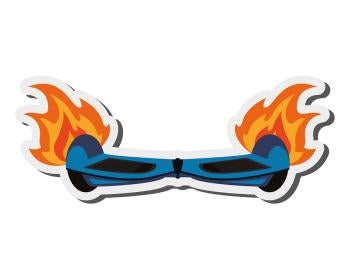Since our last blog post on lithium-ion batteries, there has been a report that a self-balancing scooter, known as a hoverboard, is the suspected cause for a March 10, 2017, fatal fire that occurred in Harrisburg, Pennsylvania. The fire resulted in the death of a three-year-old girl. Fire origin and cause experts are still investigating, but statements from persons who escaped the home indicate that a charging hoverboard “exploded” and caused the fire.
At this time, it is unknown whether the subject hoverboard was one of those involved in the sweeping 2016 recalls announced by the U.S. Consumer Product Safety Commission  (CPSC). Nonetheless, the CPSC issued a statement that the Harrisburg fire is the first reported fatality potentially involving a hoverboard battery explosion and fire.
(CPSC). Nonetheless, the CPSC issued a statement that the Harrisburg fire is the first reported fatality potentially involving a hoverboard battery explosion and fire.
When hoverboards first hit the market they were generally not regulated by any safety standard related to their batteries or chargers. Therefore, the first hoverboards included lithium-ion batteries and battery packs that were not designed or tested for the physical demands of hoverboard use. To meet consumer desires, many entities, primarily on the internet, began importing hoverboards from manufacturers that did not have the best quality control or manufacturing practices. Further, many hoverboards lacked safety protection devices common in other products powered by lithium-ion batteries. In late 2015 and early 2016, there were several reports of fires linked to charging hoverboards. In our digital and viral age, these reports were widely spread, prompting the CPSC to act, recalling more than 500,000 units.
In the wake of the 2016 hoverboard fire reports and recalls, the UL promulgated UL 2272, Standard for Electrical Systems for Personal E-Mobility Devices. In May 2016, the first hoverboard was certified to the UL 2272 standard, and thereafter hoverboards returned to store shelves and online marketplaces.
As noted in our blog post, though the likelihood of a lithium-ion battery failure is rare, the potential exposures are real and consequences may be tragic. This incident serves as a reminder for consumers to heed CPSC recalls. Moreover, it might motivate consumers to exercise greater caution when using or charging their lithium-ion powered devices.



 i
i


